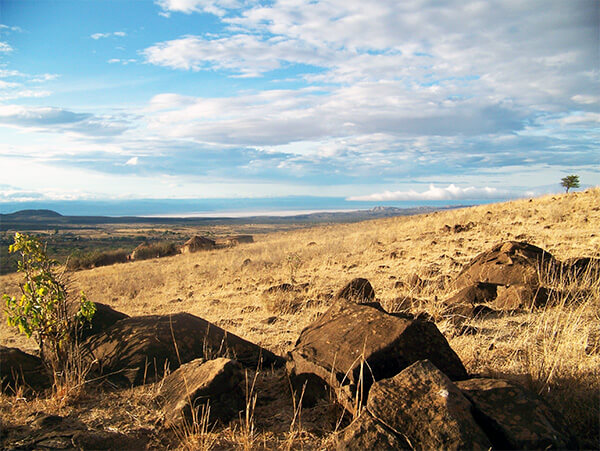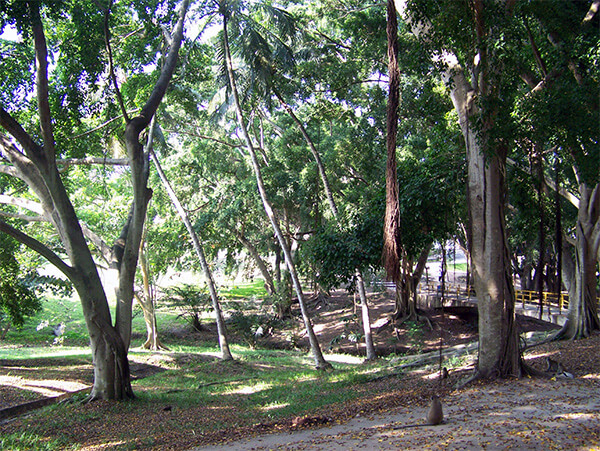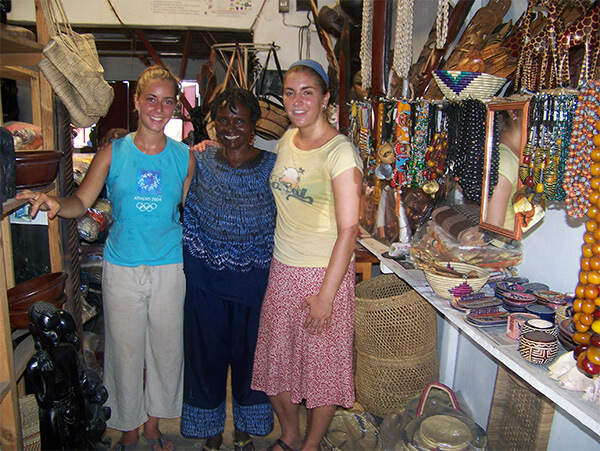Study Abroad in Tanzania
On Borders, Bananas, and Being Back
Article and Photos by Danae Roumis

|
|
The author presents her research in Endulen Hospital in the Ngorongoro Conservation Area to village authorities and hospital staff.
|
“Do you know what the problem with America is? Oceans!”
A high school history teacher explained several times to our class that having oceans on either side of our country affects our orientation in the world and, thus, the ideas we build upon that foundation. At the time, I understood what he was trying to say but hadn’t yet had the chance to internalize the message. The oceans he was talking about were the giant blue spaces on flat maps that reflected spatial conceptualizations of the world outside of America. When we imagine ourselves front and center, everywhere else is just the periphery.
But the world is not flat, and it’s impossible to locate the center point on the area of a sphere — you could not say, “I am here,” if the sphere were blank. And countries are not, in fact, separated by colorful, highlighted lines. On the ground level, one thing flows into another. Anyone is capable of knowing and understanding this — going abroad is about living it.
I studied abroad through the Midwest consortium, Associated Colleges of the Midwest (ACM), in the Tanzania Program from July–December. ACM is an organization through which students can participate in several abroad programs encompassing learning at universities, fieldwork, and a capstone independent research component. (If you don’t attend one of the consortium's colleges, many viable programs still emphasize special interdisciplinary issues and encourage independent work and unique experiences.) Traveling with an organization that provides both a multidisciplinary curriculum and practical experience is to your benefit.
I was definitely more excited than I could express during my trip preparation. The notion of going somewhere "completely different" is certainly liberating and exciting. However, with time in Tanzania, I came to be comfortable with the fact that in going abroad, I wasn’t hopping out of my borders into another set but instead was being given the chance to realize the fluidity between people and places, as well as the responsibility to act accordingly and be an ambassador of this humbling knowledge.
I was definitely more excited than I can express during preparation for my trip. The notion of going somewhere "completely different" is certainly liberating and exciting. However, with time in Tanzania, I came to be comfortable with the fact that in going abroad, I wasn’t hopping out of my borders into another set, but rather was being given the chance to realize the fluidity between people and places, as well as the responsibility to act accordingly and be an ambassador of this humbling knowledge.
In this way, I saw my experience as an ongoing translation between differences and similarities: which differences were significant? Which similarities were universal? Which of each were valuable lenses through which to study and communicate? These questions were especially pronounced during my field research. My research group was camping inside the Ngorongoro Conservation Area in the northern part of the country. While heralded as one of the most exhilarating tourist destinations in Africa or perhaps the world — and though it is a spectacularly beautiful place — we were camped behind the area’s only hospital with slightly different concerns. My own research involved going through hospital records mapping the malaria inpatients and outpatients in the villages of the conservation area. I supplemented that with community interviews to obtain a cross-section of community attitudes toward the hospital’s curative role in their malaria burden and their view toward preventive measures. The numbers I charted and the opinions I recorded were helpful information, but my learning happened between the lines. Reactions to being interviewed or emotions toward preventive measures were often misaligned with my expectations. These were most often the sites of transition for me, as my perception of what is appropriate and reasonable changed with the understanding of others’ stakes, interests, and situations in place and time in regard to the issues I was studying. In the end, the lessons' simplicity constitutes that humbling knowledge — realizing that I would probably feel the same way as many of the mothers I interviewed made me feel slightly embarrassed that I would have expected something otherwise.

|
|
A view from the top of a hill close to the author’s campsite shows the expanse of the Conservation Area and a nearby Maasai boma (village).
|
The truth is that borders are only as real as the booth staff checking your passport. There are undoubtedly administrative differences between one place and another. Still, the emphasis here is on the more conceptual notions of boundaries and identity. When you study abroad, you leave home and travel to somebody else’s. Your presence in another country is undoubtedly meaningful and interpreted in various ways. Yet, at the end of the day, there is little deviation between the basic human needs and desires of the people you came from and those in the place you are. Societies and cultures draw their own lines about what is considered appropriate behavior, and being in a different country is what facilitates contact with this alternative — specifically, the opportunity to study abroad allows a college student "new to the world" to formulate a mental map consisting of a landscape of livelihoods, with a topography of temperament, values, and mores. As you study, travel, or communicate with others, understanding that the behaviors or mores in a different place are interpretations of the common requisites of all humans makes a difference in how you do these things and will enrich your experience immeasurably.
For me, studying and researching abroad provided a realistic frame of reference for learning how public health studies and interventions are carried out. These lessons are, of course, applicable to any faculty of study. No matter what you’re doing, the most important thing is understanding the connotations of how you are doing it. With these things in mind, I internalized the message my history teacher had been repeating during my six months abroad: how we think often determines our beliefs. Studying abroad is all about the how.

|
|
On campus at the University of Dar es Salaam: “Academic bridge” connects areas of residence and dining facilities with the rest of the University. |
All of this is not meant to paint a sobering picture of what it is to study abroad. On a more light-hearted note, the second most valuable part of being abroad to me was also tied to notions of differences and similarities. However, it was not mentioned in any pre-departure orientation: Humor! You would be hard-pressed to find anyone who did not enjoy laughing. And despite different ideas about what is funny in various places of the world, it is lucky for all of us living in it that learning a language — an integral part of many study abroad experiences — and making mistakes is funny to pretty much everyone. Our program had six intensive weeks of Kiswahili at the beginning of our trip. Fortunately, we also had the chance to interact with the Tanzanian students at the University of Dar es Salaam.

|
|
The author (left) with fellow student (right) and their friend and favorite shopkeeper (middle) in a marketplace in Dar es Salaam. |
One of my favorite examples illustrates the way that humor serves as a common ground for interaction with people in different places:
In Swahili, a common greeting is “Habari yako?” — "What’s your news? How are you?"
One of the most common answers is, of course, “Nzuri.” — "Good."
One morning, a Tanzanian student asked my friend, “Habari yako?”
And she enthusiastically answered, “NDIZI!” — "…banana!"
The unexpected response delighted the Tanzanian student and amused the rest of us. I know that there are plenty of times I feel uncomfortable, embarrassed, or out of place. But the things that stay with me are these simple memories laden with meaning beyond just jokes — herein lies the fabric of our composition as humans seeking happiness through cross-cultural understanding. Whether bananas or something else, humor is powerful and should be recognized as such, in that the simple greeting and comical mishap could lead to more consequential conversations.
In my experience, these moments and insights are the most valuable things to keep in mind while you are abroad. They will shape your experience in a constructive and mutually beneficial way. However, the third element of my advice to abroad-goers is to recognize that your experience doesn’t stop when you board the airplane to go home. Before you leave, everyone wants a say in your experience. They want to tell you what to do, that you’ll have a great time, and what to pack, and don’t forget to write to them! Hardly anyone talks to you about being back. Personally, I was more culture-shocked coming back to the US, during our commercialized Christmas season, in all of the unnecessary than I was going to a place where I could so easily access the basic emotions common to people no matter the color in which they were outlined on our flat maps.
But returning is just as important as leaving because your mind and heart are swelling with images, thoughts, and experiences. No matter how light you travel, you always come back with more experience than you left. In a journal entry a couple of months after being back, I wrote, "There’s a weird reaction to certain comforts of home, a combination of ironic guilt and panicked nostalgia, and intermittent, secret appreciation for certain luxuries. Sometimes, I still don't feel back, but rather stretched across time and space."
I don’t think much has changed about a year after I wrote that. When I ride the CTA here in Chicago, I see people skip a seat between each other, maintaining their personal space. Images of the daladala in Tanzania are immediately conjured. These vans carry people to their destinations, where the only rule is that “there’s always room for just one more,” where traveling even five minutes down the road can be an adventure involving stretching, twisting, limbo maneuvers, and perhaps an encounter with an armpit or two. I walk into a pharmacy store to pick something up. I see shelves lined with medications, all labeled nicely and organized by ailment. My thoughts wander to my time in the field, where I managed to contract giardia and was given a regimen of medication from the hospital in unlabeled zip-lock baggies. I wake up every morning with no mosquito net canopies on my bed. I can drink water from the tap if I want to. I’ve surrendered to my fond memories of the place that taught me so much and channeled them toward my work now that I’m back. My grades are better — my schoolwork is fortified by knowing how to research and analyze. My focus is sharper, I may not know exactly where I will be working in the future, but I know what my passions are, what I stand for, and the causes for which I will be working. Being back means keeping your experience alive. It means encouraging others to learn the same lessons you learned and decentralizing our own orientation in the world for a more inclusive perspective of all people.
When we let down the guard of our own personal borders, we can transition between our conditioned expectations and the reality of the world around us. The same is true for learning to laugh at ourselves, finding humor in everyday life, and finding common ground. Being abroad is an incredible opportunity, and those able to do it are privileged. This is what my experience has provided for me, and that which I hope to share with anyone preparing to travel abroad: always be aware of your borders and don’t be afraid to shift them, laugh at your bananas and use them to dig deeper, and make the absolute best use of being back.
Danae Roumis graduated from the University of Chicago with an anthropology major. Her honors thesis was inspired by the research she conducted while abroad in Tanzania.
|
